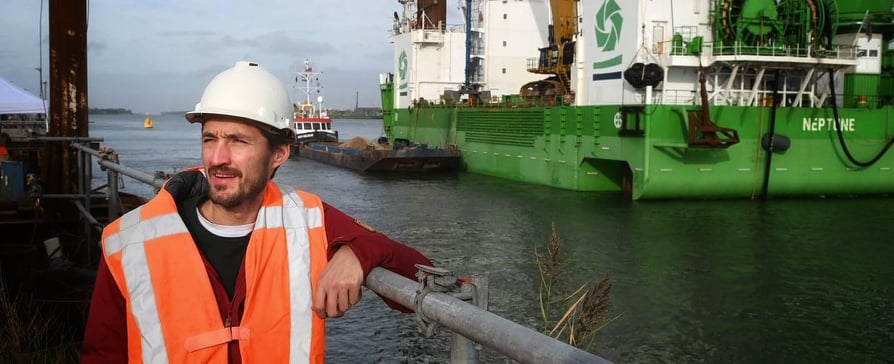From last Saturday morning, 12 November ,Sea-going vessels with a length exceeding 140 metres needed to use a tugboat on the Scheur between Maassluis and Rozenburg during strong tides, which is about three hours a day. The harbour master of the Port of Rotterdam Authority took this measure to ensure safe passage.

Since last weekend, crane vessel Neptune has been positioned in the middle of the Scheur due to the construction of the Maasdelta tunnel. As a result, the passageway is narrow. Moreover, the excavation of the tunnel trench created a nuisance transverse current. The measure is expected to last until the end of the month.

Early Saturday morning, 12 November, crane vessel Neptune shifted to the middle of the Scheur. As a result, shipping traffic between kilometre posts 1015 and 1018 – involving several dozen sea-going vessels and a few hundred inland vessels every day – should take extra care, moderate speed and follow instructions from the Port of Rotterdam Authority’s traffic controllers.

‘We are now entering the most exciting phase of the construction of the Maasdelta,’ said Pieter Nordbeck (Port Authority). ‘All shipping must be regulated to allow safe and smooth passage of the Neptune, which has been firmly fixed to the riverbed by means of legs.’
The traffic is regulated from Rotterdam Traffic Centre in Botlek. They will maintain intensive consultation with the Neptune’s captain, traffic controllers and those on board. The contractor has an escort vessel on standby to warn shipping and a tugboat in case any assistance is required.
Overtaking ban
Pieter Nordbeck: ‘The jack-up has four different centre positions. This creates a short passing route and a long passing route. Inland vessels could still pass along the short passing route.
For sea-going vessels, this was not possible. So when the jack-up is positioned in the south of the middle, shipping is only allowed to pass on the north side.
During that time, meetings will be prohibited for sea-going vessels while overtaking will be prohibited for all shipping. Overtaking means passing another vessel.’ This situation will continue until the end of November.
This operation involves laying tiles weighing 100,000 kilos each. They serve as temporary foundations for the tunnel sections of the Maasdelta tunnel. Once the tiles are in place, a diver will conduct an inspection.
From the moment the diver submerges, which will last somewhere between 15 and 20 minutes, the Scheur will be fully closed for shipping.
Full closure of the Scheur
On 31 March and 15 April, therefore, the Scheur will be fully closed for shipping. The two tunnel sections will be immersed in two whole days.
The first tunnel section will be immersed between Friday, 31 March 10.00 am and Saturday, 1 April 10.00 am. The second tunnel section will be put into place between Saturday, 15 April 10.00 am and Sunday, 16 April 10.00 am.
The tunnel is expected to be completed by 2024.














